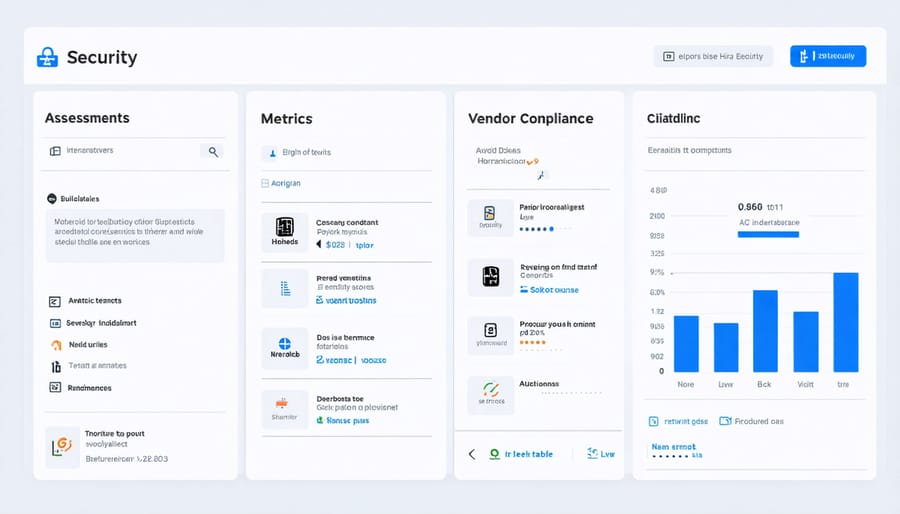In today’s interconnected construction landscape, vendor cybersecurity breaches pose a $10.5 trillion annual threat to project integrity and operational continuity. As the digital procurement transformation accelerates, construction firms face unprecedented exposure through their vendor networks. Recent data shows 63% of construction-related breaches originate from third-party vulnerabilities, with an average cost of $4.35 million per incident.
Leading construction organizations recognize vendor cybersecurity as a cornerstone of risk management, not merely an IT consideration. From architectural drawings and bid specifications to payment systems and project management platforms, every digital touchpoint with vendors creates potential entry points for cyber threats. The construction industry’s increasing reliance on cloud-based collaboration tools, IoT devices, and integrated supply chain systems magnifies these risks exponentially.
This comprehensive guide examines proven strategies for protecting your organization’s digital assets while maintaining efficient vendor relationships. Drawing from real-world case studies and expert insights from leading construction security professionals, we’ll explore practical frameworks for vendor assessment, continuous monitoring protocols, and incident response planning tailored specifically for construction environments.
The Rising Cyber Threats in Construction Supply Chains

Common Attack Vectors Through Vendors
Cybercriminals frequently exploit vendor relationships to breach construction companies’ security perimeters through several common attack vectors. The most prevalent method is compromised vendor credentials, where attackers gain access to supplier portals or procurement systems using stolen login information. This allows them to infiltrate the main contractor’s network through trusted channels.
Another significant threat comes through supplier software vulnerabilities. When vendors’ applications or systems contain security flaws, attackers can use these weaknesses as entry points to reach connected construction company networks. This is particularly dangerous when vendors have direct access to project management platforms or financial systems.
Social engineering attacks targeting vendor relationships are also increasing. Criminals impersonate legitimate suppliers through sophisticated email spoofing, requesting payment changes or sensitive information. These attacks often succeed because construction companies naturally trust their established vendors.
Supply chain malware presents another serious risk, where attackers compromise vendor software updates or digital deliverables with malicious code. When construction companies download or install these infected files, they unknowingly grant attackers access to their systems. This method is particularly effective because it bypasses traditional security measures by using legitimate distribution channels.
Real-World Impact on Construction Projects
Recent high-profile incidents demonstrate the severe impact of vendor-related cybersecurity breaches in construction. In 2021, a major US construction firm experienced a three-week project delay after their material supplier’s compromised ordering system sent incorrect specifications to fabricators. The incident resulted in $2.3 million in additional costs and damaged client relationships.
Another notable case involved a midwest commercial developer whose project management software was breached through a third-party billing system. Hackers accessed sensitive blueprint data and project timelines, leading to intellectual property theft and compromised bid information. The breach affected multiple ongoing projects and resulted in litigation costs exceeding $5 million.
In 2022, a European construction consortium faced ransomware attacks through their HVAC supplier’s remote monitoring system. The breach affected 14 active construction sites, forcing temporary shutdowns of smart building systems and causing completion delays averaging 45 days per project.
These incidents highlight the cascading effects of vendor security vulnerabilities, emphasizing the need for robust vendor assessment protocols and continuous monitoring of third-party access points. Construction firms are now increasingly implementing vendor security ratings and real-time monitoring systems to prevent similar occurrences.
Essential Vendor Security Assessment Frameworks
Security Questionnaires and Compliance Requirements
Security questionnaires and compliance assessments serve as crucial tools in evaluating vendor cybersecurity readiness within the construction industry. These standardized assessment frameworks help organizations systematically evaluate potential risks and ensure vendors meet regulatory requirements while implementing secure supply chain technologies.
Key components of vendor security questionnaires typically include:
– Data handling and storage protocols
– Access control mechanisms
– Incident response procedures
– Business continuity planning
– Network security measures
– Third-party risk management
Construction firms must ensure vendors comply with industry-specific regulations such as ISO 27001, NIST frameworks, and regional data protection laws. This becomes particularly critical when dealing with sensitive project data, building information modeling (BIM) files, and proprietary specifications.
To streamline the assessment process, organizations should:
1. Develop standardized questionnaire templates tailored to construction industry needs
2. Establish clear scoring criteria for vendor evaluation
3. Implement regular review cycles
4. Maintain documentation of vendor compliance status
5. Create remediation plans for identified gaps
Regular monitoring and updates to these assessments ensure continued compliance and help identify emerging security risks before they impact project delivery or compromise sensitive data. This proactive approach to vendor security assessment has become an essential component of modern construction risk management strategies.
Continuous Monitoring Strategies
Maintaining robust vendor cybersecurity requires a proactive approach to continuous monitoring and assessment. Construction firms should implement automated surveillance systems that track vendor security performance in real-time, enabling quick response to potential threats. AI-powered vendor monitoring solutions can detect anomalies and potential security breaches before they escalate into major incidents.
Key monitoring strategies include regular security posture assessments, continuous compliance verification, and automated vulnerability scanning. Organizations should establish clear metrics for vendor performance evaluation, including incident response times, security patch implementation, and compliance with industry standards. These metrics should be reviewed quarterly and incorporated into vendor performance scorecards.
Documentation of monitoring activities is crucial for audit trails and regulatory compliance. Construction firms should maintain detailed records of security incidents, remediation efforts, and vendor responses. This documentation supports informed decision-making during vendor reviews and contract renewals.
Risk-based monitoring frameworks help prioritize oversight activities based on vendor criticality and access levels. High-risk vendors require more frequent assessments and may need to undergo additional security audits. Companies should also establish clear escalation procedures for addressing security concerns and implement regular stakeholder communication channels to ensure transparency in vendor risk management.

Implementing Secure Digital Procurement Practices
Secure Integration Protocols
Establishing secure integration protocols is critical when connecting vendor systems to your construction management infrastructure. Begin by implementing a robust API security framework that includes OAuth 2.0 authentication and role-based access control (RBAC). All data transmissions must be encrypted using TLS 1.3 or higher, with regular certificate validation and renewal processes in place.
Require vendors to support secure file transfer protocols (SFTP) for document exchanges and implement endpoint security measures including regular vulnerability scanning and penetration testing. As construction projects increasingly rely on smart contract implementation, ensure that blockchain integration protocols follow industry best practices for cryptographic security.
Establish a vendor security baseline that includes:
– Multi-factor authentication (MFA) for all system access points
– Regular security patch management schedules
– Automated monitoring and alerting systems
– Data backup and recovery protocols
– Incident response procedures
Integration interfaces should be documented with detailed API specifications, including security requirements and data handling protocols. Implement API rate limiting and monitoring to prevent denial-of-service attacks and maintain system performance. Regular security audits should verify compliance with these protocols, with particular attention to third-party dependencies and supply chain vulnerabilities.
Consider implementing a zero-trust architecture approach, requiring continuous verification regardless of whether the connection is from inside or outside the network perimeter. This is particularly important for construction sites where multiple vendors may need varying levels of system access from different locations.
Data Protection Standards
In today’s digital construction landscape, protecting sensitive procurement data requires robust standards and protocols. Construction firms must implement comprehensive data protection measures to safeguard both their own and their vendors’ information throughout the procurement lifecycle.
Essential data protection standards include encrypting all sensitive procurement documents using industry-standard protocols, particularly when sharing bid information, pricing details, and proprietary construction specifications. Organizations should establish multi-factor authentication for all procurement systems and maintain detailed access logs to monitor who views and modifies vendor data.
Vendor agreements must explicitly outline data handling requirements, including data storage locations, retention periods, and disposal procedures. Construction firms should require vendors to maintain compliance with relevant data protection regulations such as GDPR and CCPA, especially when handling international projects or working with overseas suppliers.
Regular security audits of vendor systems and documentation processes help ensure ongoing compliance. This includes verifying that vendors maintain secure backup systems, implement proper data segregation, and follow incident response protocols. Construction companies should also establish clear procedures for handling data breaches, including notification requirements and remediation steps.
Document classification systems help identify and protect sensitive information, ranging from confidential pricing structures to proprietary construction methods. Organizations should implement role-based access controls, ensuring that employees and vendors can only access information necessary for their specific functions.
Cloud-based procurement systems require additional security measures, including encryption at rest and in transit, regular vulnerability assessments, and secure API implementations. Companies should also maintain detailed documentation of all data protection measures and regularly update their security protocols to address emerging threats in the construction technology landscape.
Building a Resilient Vendor Network

Vendor Education and Training
Implementing comprehensive vendor education and training programs is crucial for maintaining robust cybersecurity across the construction supply chain. These programs should focus on both technical competencies and security awareness, ensuring vendors understand their role in protecting sensitive project data and maintaining digital infrastructure integrity.
A well-structured vendor education program typically includes regular security awareness training, updates on emerging threats, and practical workshops on implementing security controls. Construction firms should provide vendors with clear documentation of security policies, incident response procedures, and best practices for handling sensitive information.
Key components of an effective vendor training program include:
– Data handling protocols and classification systems
– Password management and multi-factor authentication procedures
– Recognition of phishing attempts and social engineering tactics
– Secure file sharing and collaboration platform usage
– Incident reporting and escalation procedures
Industry leaders recommend conducting quarterly security assessments and annual comprehensive training sessions. These should be supplemented with regular security bulletins and updates specific to construction industry threats. Documentation of training completion and compliance should be maintained as part of vendor management records.
Consider implementing a tiered training approach based on vendor access levels and risk profiles. High-risk vendors who handle sensitive design documents or financial information should receive more intensive training compared to those with limited system access. Regular evaluation of training effectiveness through simulated security scenarios helps identify areas requiring additional focus.
Success metrics should track vendor compliance rates, security incident reduction, and improved response times to potential threats. This data-driven approach ensures continuous improvement of the training program while maintaining alignment with evolving industry security standards.
Incident Response Planning
Effective incident response planning requires a collaborative approach between construction firms and their vendors to ensure swift and coordinated action during security breaches. This partnership should establish clear protocols for incident reporting, communication channels, and response procedures.
Begin by developing a comprehensive incident response framework that outlines roles and responsibilities for both parties. Your vendor agreements should explicitly define incident notification requirements, including timeframes for reporting breaches and the specific information that must be shared. Consider implementing a shared incident management platform to streamline communication and documentation.
Regular joint tabletop exercises with key vendors help test response procedures and identify potential gaps in coordination. These simulations should cover various scenarios, from data breaches to ransomware attacks, ensuring all stakeholders understand their roles during an incident.
Document specific escalation procedures and establish a chain of command that includes both internal teams and vendor representatives. Include provisions for after-hours contact information and backup communication methods in case primary channels are compromised.
Consider implementing shared monitoring systems that allow both parties to detect and respond to security incidents promptly. This collaborative approach should include regular reviews of incident logs and joint analysis of security events to improve future response capabilities.
Establish post-incident review procedures that bring together both parties to evaluate response effectiveness and implement necessary improvements. This continuous improvement process helps strengthen the security partnership and enhances overall incident preparedness.
As the construction industry continues to embrace digital transformation, strengthening vendor cybersecurity remains paramount for long-term success and risk mitigation. Organizations must prioritize comprehensive vendor assessment protocols, implement robust monitoring systems, and maintain clear communication channels with their supply chain partners. Regular security audits, coupled with continuous updates to security policies, will help construction firms stay ahead of emerging threats.
Looking ahead, the integration of artificial intelligence and machine learning in vendor risk management will become increasingly important. These technologies will enable more sophisticated threat detection and automated response mechanisms, helping construction companies protect their digital assets more effectively.
Key actions for maintaining strong vendor cybersecurity include:
– Establishing clear security requirements in vendor contracts
– Conducting regular security assessments and compliance checks
– Implementing multi-factor authentication across all vendor access points
– Developing incident response plans that include vendor-related scenarios
– Investing in ongoing cybersecurity training for staff and vendors
– Maintaining updated vendor risk profiles and security documentation
The future of vendor cybersecurity in construction will likely see increased regulatory requirements and standardization of security protocols across the industry. Companies that proactively develop robust vendor security programs now will be better positioned to adapt to these changes and maintain competitive advantages in an increasingly digital construction landscape.
Remember that vendor cybersecurity is not a one-time implementation but a continuous journey requiring regular assessment, adaptation, and improvement to stay effective against evolving threats.

